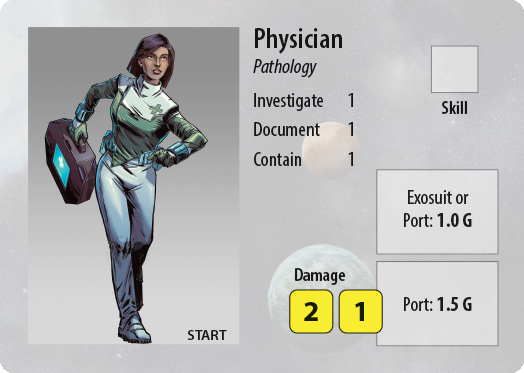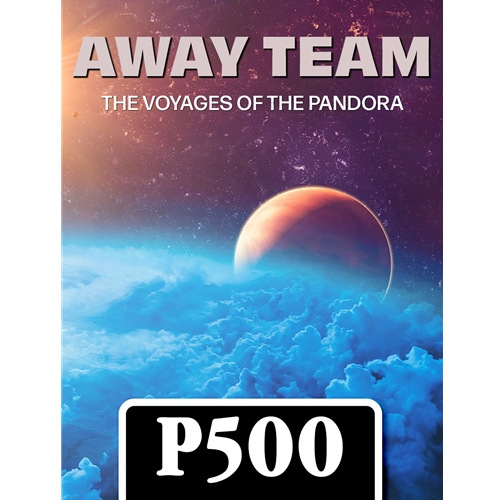AWAY TEAM: The Voyages of the Pandora is a game of exploring alien worlds in distant star systems. You command the Pandora, an interstellar survey ship on its voyages of discovery. Each voyage sends Pandora to a different star system where you assemble away teams from the ship’s crew and equipment to explore planets, moons, and other sites of interest, with the following directives:
- Locate exo-life forms and document their physiology and behavior
- Collect exo-DNA, vital to genetic science and human adaptation to life in the stars
- Identify and survey environments suitable for human settlement and development
- Search for intelligent life and alien cultures; and if found, establish contact with goodwill
- Don’t get killed.

AWAY TEAM has three modes of play:
- The solitaire campaign game provides an epic, interconnected, narrative experience for one player across seven star systems, providing over 80 hours of play time, exploration, and plot-twists.
- The solitaire star system game provides one player with a repeatable play experience commanding one Pandora voyage to a single star system. You set the experience level of your crew and the danger level of each voyage.
- The 2-player game puts players in command of competing away teams from Pandora in a voyage to a single star system—also a repeatable play experience.
Forty years ago, John Butterfield designed The Voyage of the BSM Pandora, the ground-breaking solitaire paragraph-driven game for SPI. Now John takes his branching narrative game concept into a new dimension with Away Team: The Voyages of the Pandora.

 The core of the game is a new book of 1,000 interactive passages, enhanced by:
The core of the game is a new book of 1,000 interactive passages, enhanced by:
- Seven star system boards, each with several exploration sites
- Surface maps depicting different alien landscapes for the away team to explore
- Illustrated crew cards with attributes and skills of the people and bots aboard Pandora at various levels of experience
- Illustrated encounter cards, each a mini-story with multiple possible outcomes
- Voyage cards that trigger events in space and the surface, as well as surprise checks, encounter analysis, and attempts to heal and repair crew and equipment
- Discovery Tiles that provide findings and challenges to supplement primary encounters

In a typical Away Team “planet drop” you will:
- Survey the site for a location with potential life and favorable exploration conditions
- Choose people, bots, and tools for the team, based on their attributes and gravity limits. Will the surface rover vehicle be helpful in the terrain?
- Launch the Cricket lander from Pandora to the surface. Let’s hope this landing is smoother than the last debacle.
- Debark the away team on foot or in the rover and commence movement and exploration
- Draw discovery tiles, based on the abilities of your team and the alien features of the site. That fungus looks interesting—oh wait, it’s moving.
- Draw encounter cards, each an interaction with a life form or phenomena requiring several strategy decisions with multiple outcomes. The creature appears to be signaling us; should we engage with it, take readings from a distance, or run for our lives?
- Expend supply as you go. Can we risk examining these crystals, or should we get back to the Cricket while we can still breathe? Too bad that detour around the sword grass cost us precious time.
- Collect data, incur damage, become terrified, get eaten

Join Pandora’s away team and explore the galaxy, one fraught decision at a time.
Components:
- One 22” x 17” mounted game board, two-sided
- Twelve 8.5” x 11” Environ Maps, two-sided
- Four 5.5” x 8.5” Star System maps, two sided
- 240 playing cards
- 50 status cubes
- Two sheets of premium counters, various shapes and sizes.
- One rules book
- One 92-page passage book
- One training mission booklet
- Four player aid cards, two sided
- One custom 6-sided die and one standard 10-sided die
- One draw bag
- 4” box and lid


Comentarios